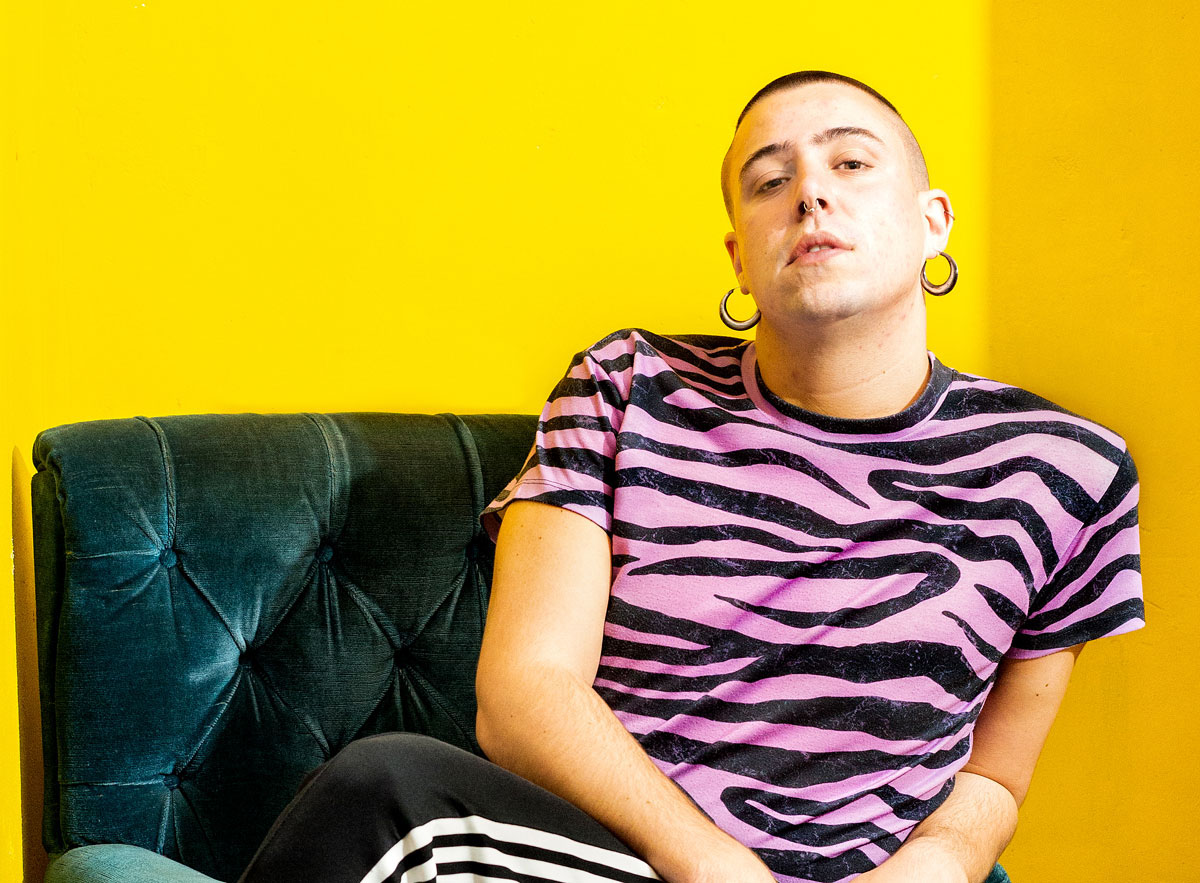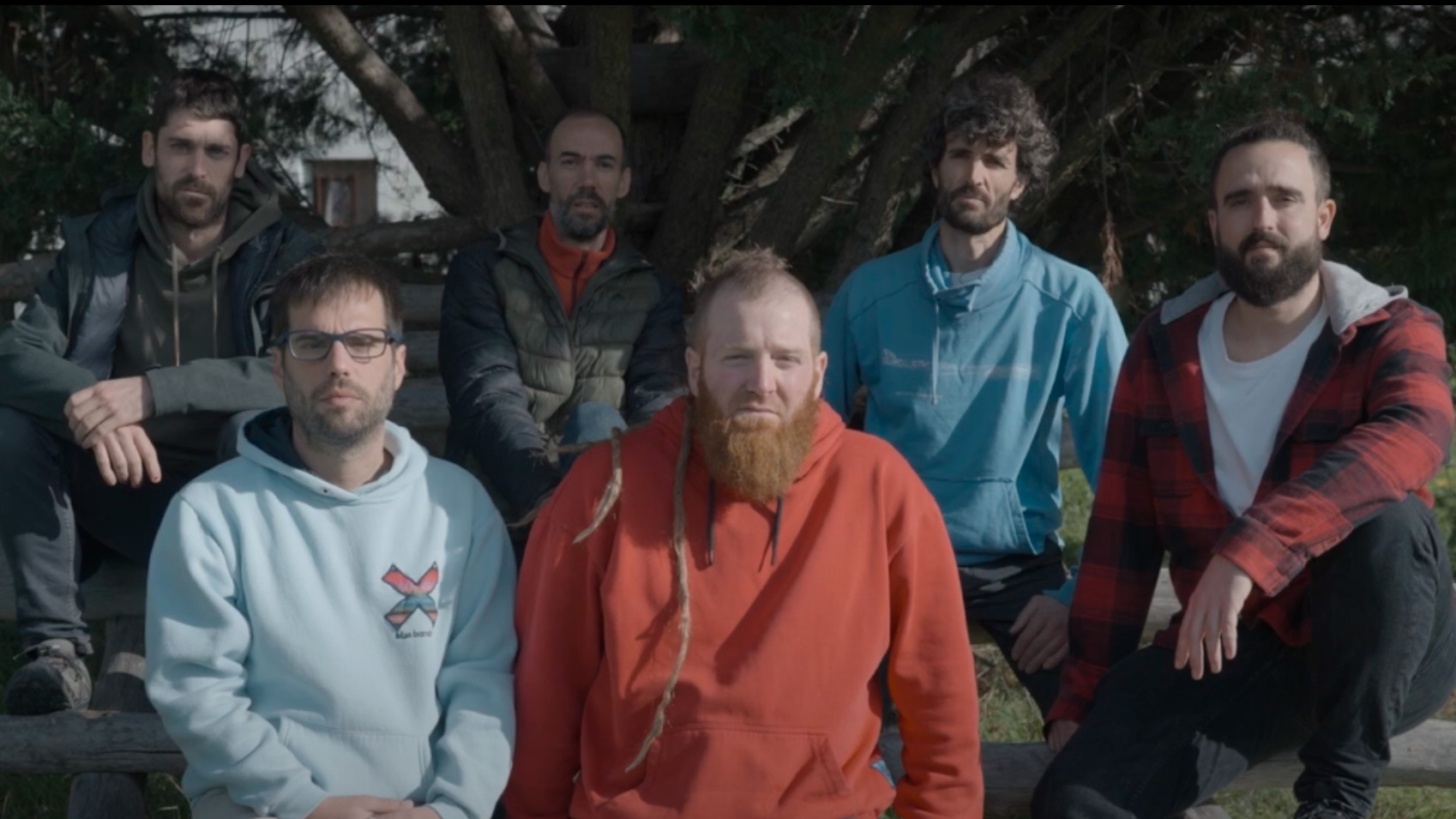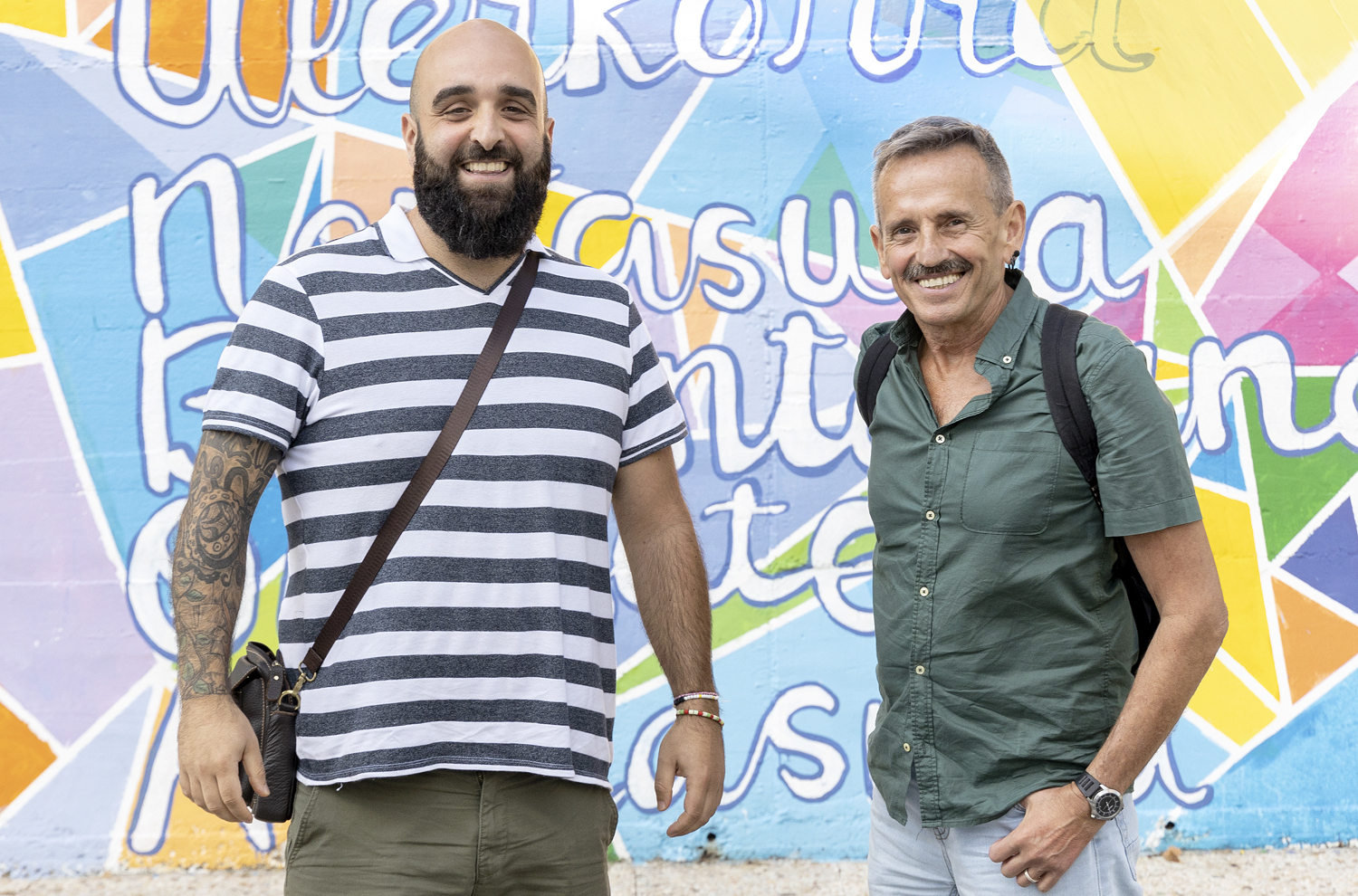"Men have to do things that affect them: take care of them, clean them... position themselves in the private space"
- Graduated in Social Education, in the last two years she has worked in the Eihera cooperative in the field of co-education and masculinities, designing processes of feminist transformation and LGTBI+ and dynamizing all types of formative sessions.

Gros auzokoa da Iñigo. Ama Grosekoa du jaiotzez, bere birraiton-amonek han erosi zutelako etxea, auzoa oraindik hiri-ingurua zenean eta puten eta jonkien auzoa esaten zitzaionean. Gurasoek hala erabakita Zurriola ikastolan hasi zen ikasten, eta Kortxoenean segi. Handik hainbat militantzia esparrutan aritu izan da, izan Ernai-n, E28ko koordinadoran, zein Donostiako Transmarikabollo asanbladan. Eiherako lokalean egin dugu hitzordua. Grabagailua mahai gainean jarri, eta nire buruak su hartu du.
Let’s start from childhood…
Barrio de Gros, 90s, Ikastola Zurriola.
I studied at ikastola Zurriola, until I was 18. My childhood memories are pretty good. Breaking topics, my friends were, of course, girls. I don't know if it was because of intuition, but I quickly understood that if I stayed in that position I would pick it up, and I saw that in order to survive my site I had to be a group of kids. So my biological crew consists of a heterogeneous man. I spent the teenage years quite well. The school age wasn't that hard, let's say, to have a marble in a hetero gang. Maybe it protected me well. It wasn't me who was quiet. What I remember is a long “jo, I get bored.” Eating ultra-processed, playing football, commenting girls... That wasn't done for me.
And all of a sudden, the Gaztetxe Kortxoenea.
I walked into Kortxoenea by the people around me. I was 16-17 years old. Gaztetxe had just been occupied and was next to the ikastola. At first, the elders of the ikastola invited us to an assembly. We appeared without just knowing where we were. I didn't understand what that was, but I realized that people were interesting to me. I entered the Gazte Asanblada and walked there for three or four years, until they threw it out.
Suddenly, Zukgu started the process, and I was there again without the slightest idea of what it was. For months, over 2,000 young people met in this process that would culminate in the creation of the Ernai youth organization. Training was an amazing time. And there I had another intuition. Now I say I started militating because I knew I was Marica. Because at the time I could intuit that some of the attitudes of people around the militancy environment, or the philosophy of these people's lives, allowed me to live more comfortably in that identity. Now I've learned to put words to this. I would not do so at the right time. What I knew was that I didn't smell exalted adolescence. Of course, it was a heterogeneous space, but for me it was a more habitable space.
And when does feminism get into that?
When Ernai was born, he designed what was called the first feminist step. That was great. I remember that process with a tremendous fondness, and I'm sure a lot of girls too. It was my first contact with feminism. I started to understand that marica was political. This process made an even more habitable space more habitable. If I had reached eight years of Ernai's birth, I might not have lasted. That's happened to a lot of people. But it was immediately after his birth. Because someone punched a punch at the table.
Thanks to them, militancy spaces changed a lot. In addition to a very powerful theoretical position, concrete measures were adopted to manage power relations, such as the design of a feminist veto. Many mixed spaces are more habitable thanks to this process.
The feminist step put many privileges at risk, and when things were factually changing, some interrupted him with Ernai. It's no coincidence. Some men (or these) have found a new political strength to maintain their masculinity, once again in the name of socialism.

Initially, however, the effort was to balance the power relations between the power of heterogeneous men and militant women, above all ... How did you experience that process as a Marica man?
Unconsciously. I first started to understand what feminism was and how the entire sex-gender system is going through it. There, among other things, I went to Mexico with an Erasmus scholarship and upon return I experienced an era of explosions. At the time, I had no definition of what it was. He needed to prove to him that he was not a man like others and that he was, of course, not heterogeneous. It placed me on an ambiguous spectrum. Aesthetically, I used makeup, female clothing... It lasted about a year. Then I stopped dressing like this, on the one hand, because I was quieter once I gave my position around me, and on the other – it is sad to say so – also out of fear. I have not lived from the plot – because people’s experiences are going to be very similar or worse – but on the one hand I lived from strength, “this is me, and here you have me”, but at the same time it produced me laziness and anxiety.
At the same time, when I came back from Mexico, we set out to prepare some kids' sessions, and on that road came the politicization of having marika in me. It was not a theoretical issue, but it was explained, understood and ended. I was putting myself step by step and at every moment I was defining my space.
Did you have a safe reference?The
truth is that the road has been quite solitary. Of course, then they would also be referents! Some I've known later in the LGTBI+ movement, but at the time I didn't have anyone in sight. Many people have opened the way for me to be where I am, but at that time I did not have a direct reference. I was able to politicize my delicacy thanks to the feminist girls who militated with me. They have been my referents.
Now you work with young people and young people… The question always: “How do today’s young people come?” I will
inevitably answer you from the adult power, but what do you want me to tell you… they come better. It has to be said. That does not mean that there is no violence, of course, in schools, for example. However, the work done by one people and by the feminist movement has improved in many ways. I am now 25 years old, and when we did those kinds of programs, not 30 years ago, eight years ago, the level was very different. Today, the content of the debate has changed completely. It is true that they have the discourse more internalized than the practices, because the tasks have also been larger at this level, and because internalizing a discourse is easier than changing everyday practices, of course. They don't match what they say and what they do. But also in the case of adults, it goes without saying. The practices have also changed with regard to us, those of some boys and especially those of many girls. Not because their practice was wrong, but because some of their practices are now being punished less. They have resources or supports for empowerment. The discourse itself, therefore, has created spaces of breathing in the practice of a people. And there's something.
As for the discourses with young people, it seems that we sometimes forget that there is so much distance from us as from
us… That’s right. We say we don't understand them, but many times we don't want to understand them. But if we want to work with them, we have to exercise. We are talking about social networks in particular. Today, young people live virtually and... Social media has changed codes, but code change occurs across generations, and this is not new. And understanding requires an exercise not only because they are young and we are not – or not so much –. As in any other power relationship, you must walk a path from the position of a privileged to understand your self. Understanding young people requires questioning some adult privileges. And that's a decision.
We're very critical of social media when we talk about young people. Anyway, Tic Tok, anyway Instagram… I am super
in favor of the Internet. I understand where certain fears can arise from social media. Of course, social networks, as they are created in a heteropatriarchal capitalist context, will transport heteropatriarchal and capitalist content. But our clothes are too. And what we eat as well. Social networks are also new avenues for male violence – there is nothing more to see about the phenomenon of penile photos. But when we criticize social media, we often criticize them from a privilege. And specifically, it's a hetero privilege. Social networks have allowed many young people to have debates outside the school and family structure that has touched them, to share their doubts, to relate to those who have more similar tastes or identities, to find references, to share experiences, to see that you are not alone. And of course, to say that social networks are bad, because I don’t know… If you’re a straight white guy, you have referents to right and left, up and down. But if you're outside the heteronorma, see where you find the referents. For many people, social media has been an impressive breathing space, and that's often talked very little about. I think social media has great political potential, and we don't get enough of it.

When you work with both young people and adults, you do a differentiated job with those who have been socialized as boys and girls.
Yes. We differentiate, on the one hand, because boys need a differentiated job, but first, so that girls have a space, so that they are not in mixed spaces all the time, so that they can share their intimate experiences with classmates and not endure them. Of course, I work with the kids. And our starting point is quite concrete: children are not victims of patriarchy. At some point, the priority will be to work emotions with the kids, but now the priorities are more serious. Now is the time for men to understand once and for all that masculinity brings power, and therefore, the exercises we do with boys are to understand their position in patriarchy. Not feminism. Patriarchy. After understanding the position of masculinity in the gear of patriarchy, and that masculinity itself has violence, we will work to see what position boys can have in feminism… or not.
You say that masculinity has the violence itself. Any masculinity? With
this of hegemonic and new masculinities, we must understand that masculinity, whatever it may be, is not an alternative. Non-hegemonic masculinities can sometimes be an instrument, a way to start detaching from the heteronormative... A transitional phase. But we can't think that new masculinities are an alternative, because masculinity, whatever it is, always involves violence. Of course, in these non-hegemonic masculinities, some violence has been managed. They don't rape her. They understand that sometimes you have to keep quiet, sometimes on your own. This is necessary, and in this sense, it is right to move away as far as possible from hegemony. But even in those alternative masculinities, if you socialize as a man, it will not violate him, it will not be in a juerga that gets the most painful, not a slug, but surely you will not do the surveillance work, it will probably provoke a fear in the public spaces, even if you do not want, society will read you as a person with more power, in meetings you will listen with more attention, in family you will have a position, your aesthetics will not perish.
Although it is not normative, to the extent that we socialize as men – this is also true for me, of course – we have a power, and that, in itself, brings violence. Even if it is passively. That is why I say that this is not an alternative. New masculinities are presented as solutions and they're not the solution. They're a transition. Like Marika, we socialize as men and have us in many spaces and contexts, and that also gives us power. There is no one here except to give substance to violence.
What is the place of men in feminism? Can they be allies? Feminist men? Where should they place it?
It's not easy. If at the demonstration on 8 March they are told that they have to be behind, they will be placed as far back as possible to get feminist points. It's very difficult not to cheat. I think we have to start asking men to do things that fascinate them and make them sting. Allies? Feminist men? Boys no longer have to find an identity position within feminism. What they should do is make some decisions about their lives, not in the public space, but in the private. Start taking care of yourself. Start cleaning. Start calling your grandmother. Caring for your friends. Others do the jobs that make your life more comfortable. Start by not understanding that all women are a potential pinch, start to understand that you are also a penetrable subject – and I don’t just mean touching your anus a bit at the time of penetration, which can also be profitable. The thing is, they're not prepared for that. In public space, yes. There is nothing else to do with the number of men who registered on 8 March in the surveillance centres. Where are these during the week? That they position themselves in the private sphere I think that is the place where they are in feminism. What matters the least is whether they are feminist men, allies or what christ they are. Right now the debate is not what place they have in feminism.
Ander Magallon, Mikel Irure eta Xabier Jauregi Metropoli Forala saioan egon dira maskulinitate berrien inguruan mintzatzen.
Ander Magallon, Mikel Irure eta Xabier Jauregi Metropoli Forala saioan egon dira maskulinitate berrien inguruan mintzatzen.
With the excuse of an act that I am not going to mention here, an intimate friend gave me the plant The Love of Man (Tradescantia fluminensis), because it seemed to him the most appropriate plant to give to a vollera. We put it on a shelf in the house, next to the giant plant... [+]
October 2 is International Non-Violence Day. It can't be a Nonviolence Day, if I don't know if we could do something beyond breathing. Non-violence for a single day would be a tsunami for the system. The journalist Danilo Albin recalls the celebration in the news about the war in... [+]
Maskulinitateen lanketan ematen den profil honen inguruko hausnarketa egin dute Hiruki Larroxako kideek.
Bi mutil kantinera atera dira aurten, Donostiako haurren danborradan. Aitzindari izan dira, lehen aldia baita mutilak kantinera gisa ikusi dituguna, jaietan ere hain zurrun erreproduzitzen diren genero rolak apurtuz eta maskulinitate tradizionala desafiatuz.
























